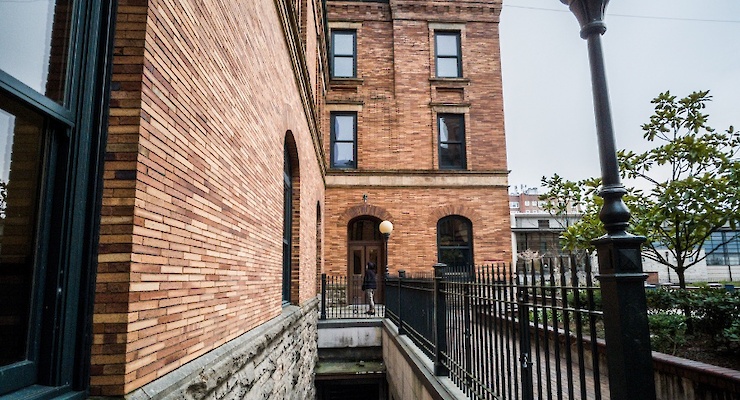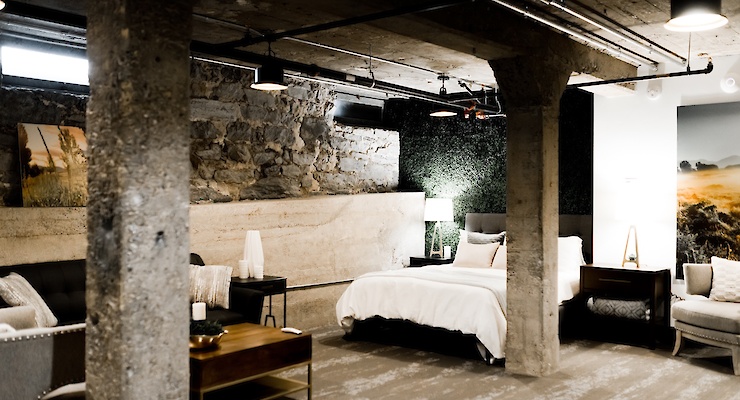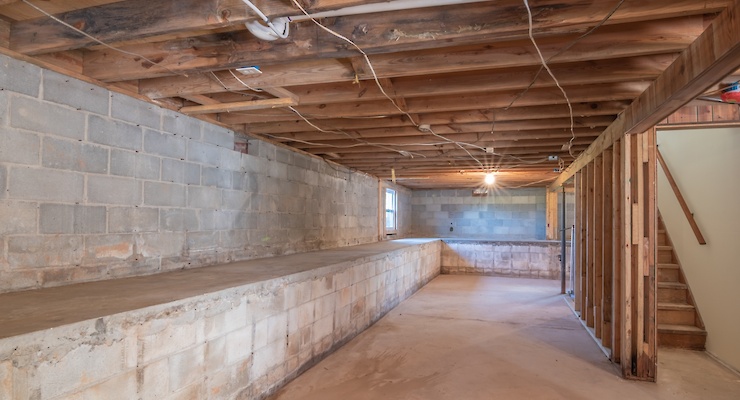


Head of Content

Mortgage Advisor & Director

Basement flats offer a refreshing alternative to traditional above-ground apartments, and their popularity is rising in places like London. In this article, we'll look at the practicalities of getting a mortgage for a basement flat and explore the potential of converting your basement into a charming living space. We'll also discuss the challenges and solutions associated with basement flat living, including limited natural light, dampness, and privacy concerns.
Understanding Basement Flats
Basement flats, often found in Victorian buildings, provide a unique and exciting living experience in the heart of the city. They are living spaces located on the lower-ground level, offering a refreshing alternative to traditional above-ground apartments. In London, basement flats are fairly common and come in various types, from self-contained apartment units to shared spaces within larger properties.
Iceberg conversions, for example, are incredibly versatile basement conversions that create unique spaces for a variety of uses, including:
- Garden flats
- Home offices
- Gyms
- Entertainment rooms
Characteristics of basement flats
One of the attributes of basement flats is limited natural light due to their lower ground floor position. However, this can be turned into an advantage, as it offers extra privacy and cosiness compared to upper floors. Additionally, basement flats often have practical layouts, ranging from open-plan to multi-roomed, making them a versatile choice for various lifestyles. Many basement flats also come with direct access to outdoor spaces, such as gardens or patios, creating a unique blend of indoor-outdoor living.
Types of basement flats
Basement flats come in various types, including self-contained units, where the flat is completely independent and has its own entrance from the street. Shared basement flats, on the other hand, are part of a larger property and have communal areas like living rooms or kitchens shared with other residents. These basement units or flats offer a more affordable option for renters or buyers. Other types of basement flats include garden flats, which have direct access to a private outdoor space, and cellar conversions, where the lower ground floor is converted into living space while retaining the upper floors as they are.
How easy is it to get a mortgage on a basement flat?
The majority of mortgage providers will lending on basement flats, but some have extra requirements and caveats for this property type, such as the following:
- LTV caps: Some lenders have higher deposit requirements for basement flats, requiring borrowers to put down at least 20% of the property’s value.
- Damp proofing: There are lenders who specify that damp proofing and tanking works must have been carried out if the majority of the property is underground.
- Square meterage: Some providers will only lend if the basement flat is at least 30 square meters, has adequate natural light and ventilation.
- Maximum storeys: There are lenders who won’t offer a mortgage if the building is more than five storeys tall, including the basement flat.
- Valuer’s comments: Lenders tend to place additional scrutiny on the valuer’s comments for this property type. They can make or break a mortgage deal.
Given that there can be extra criteria to meet for this property type, it’s advisable to speak to a mortgage broker who specialises in complex property types before you apply.

Get tailored mortgage advice for basement flat buyers
Which mortgage lenders are available for this property type?

The majority of mortgage lenders will at least consider this property type. There are only a handful, such as Cumberland Building Society, Mansfield Building Society, Bath Building Society and Market Harborough Building Society who will decline outright.
However, many of the UK’s high street mortgage providers apply extra terms and conditions on basement flats and tend to put more stock in the valuer’s comments.
Benefits of basement flat living
Living in a basement flat comes with a variety of advantages that can make it an attractive option for renters and buyers alike.
For instance, basement flats are often more affordable than above-ground flats, providing great value for money. They also offer generous living areas and direct access to outdoor spaces, such as communal gardens or private patios, a luxurious privilege in London.
Moreover, basement-level flats typically have their own entrances and spacious floor plans and can be more cost-effective than street-level flats. To summarise, the perks of a basement flat are typically:
- Affordability
- Spacious living areas
- Direct access to outdoor spaces
- Accessibility
Affordability and value
One of the main reasons why basement flats are such a great value is their affordability.
They are often more budget-friendly than above-ground flats, making them an excellent choice for those looking to make extra income and save on housing costs. The size/price ratio of basement flats can be attractive, as they can provide more room for the same cost compared to other flats. This makes them an appealing option for individuals and families alike who need extra space and seek great value in the competitive London housing market.
Spacious living areas
Basement flats are known for their spacious living areas and bedrooms, which can offer more room for the price compared to other flats.
For example, a two-bedroom basement flat may have the same amount of living space as a three-bedroom flat on an upper floor but at a lower cost. This increased space can be beneficial for families or individuals who need more living space without breaking the bank.
In addition to being more spacious, basement flats can provide a unique living experience. With their lower ceilings, creative layouts and potential for innovative design solutions, they can offer a refreshing alternative to traditional above-ground apartments. Furthermore, having direct access to outdoor spaces, such as communal gardens or private patios, can greatly enhance the overall living experience in a basement flat.
Outdoor access and garden spaces
Direct access to outdoor space can be a significant benefit of living in a basement flat.
Having the opportunity to relax, entertain guests, or grow plants in your garden flat or outdoor space is a rare privilege in London, and can contribute to your overall well-being.
Moreover, accessing an outside space like a communal garden or a private patio can make you feel more connected to the natural world, which is especially important for city dwellers. Whether you're enjoying a morning coffee on your patio or hosting a weekend barbecue in the communal garden with upstairs neighbours, the outdoor access provided by basement flats with their own front door is truly a priceless advantage.
Challenges of basement flat living
While basement flats offer numerous benefits, they also come with their own set of challenges. Limited natural light, dampness, and privacy concerns are some of the issues that can arise in basement flats. However, there are practical solutions to address these challenges and enhance the overall living experience in a basement flat.
We will discuss various ways to mitigate these challenges, such as installing window treatments for privacy and security, ensuring proper ventilation, and implementing damp-proofing measures, to enhance your experience of living in a basement flat.
Limited natural light
Limited natural light is a common challenge in basement flats due to their lower ground floor position. However, there are ways to enhance natural light and create a brighter living space. Some tips include:
- Using light-coloured walls to reflect and amplify natural light
- Placing mirrors strategically to bounce light around the room
- Adding additional lighting fixtures to brighten up the space
Additionally, installing skylights or light wells between two bedrooms can bring in natural light from above, making a significant difference in the overall feel of the flat. By taking advantage of these methods, you can transform a basement flat with limited natural light into a cosy, inviting space. This will not only make the space more visually appealing but also contribute to a positive living environment.
Dampness and mould growth
Dampness and mould growth can be a concern in basement flats, especially when compared to upper floors. However, proper measures can help to effectively address these issues, such as tackling basement flat damp:
- Ensure proper ventilation
- Install insulation
- Implement moisture control measures
- Maintain the building well
- Ensure drainage systems are in good condition
Taking the necessary precautions to address dampness and mould growth in basement flats not only ensures a healthy and comfortable living environment but also helps to protect the property from potential damage. By tackling these challenges head-on, you can enjoy all the benefits of basement flat living without the worry of dampness and mould.
Privacy and security
Privacy and security are important factors to consider when living in a basement flat.
Window treatments such as blackout curtains, blinds, and shutters can be used to greatly improve privacy and security in basement flats. Additionally, installing additional locks or security systems can enhance the overall safety of the property. By addressing these concerns, you can feel more at ease in your basement flat and enjoy the benefits of a private and secure living space.
Flooding risks
Awareness of flooding risks is crucial when considering a basement flat, as they are more susceptible to flooding than upper floors due to their lower ground level. Ensuring your basement unit has proper drainage and adhering to building regulations can help protect your property from potential flood damage.
How a broker can help you get a basement flat mortgage

There are extra pitfalls you can land in when applying for a mortgage to buy a basement flat, as some lenders will decline your application or hike up their rates if risk factors such as a lack of natural light or inadequate damp proofing is present.
Speaking to a mortgage broker before you apply can help you navigate these hurdles. They will ensure that you are matched with the ideal lender for your property type, minimising the possibility of rejection and increasing the likelihood of you being offered a good deal.
Get in touch today to take advantage of a free, no-obligation chat with a broker who specialises in basement flats to find out how much you could potentially save.
Precautions to take
Certain precautions should be taken into consideration for a positive living experience when buying or renting a basement flat. These include:
- Speak to a broker who specialises in complex property types
- Checking for proper ventilation, damp-proofing, and insulation in the property
- Ensuring that there are emergency exits in case of fire or other emergencies
- Verifying the ownership and legality of the basement flat (e.g. planning permission)
- Inspecting the outdoor space for potential issues such as drainage problems or lack of maintenance
Converting Your basement into a flat
If the idea of converting your basement into a flat is on your mind, there are several potential advantages worth considering. A basement conversion can provide additional living space, rental income, or increased resale value. However, it's important to carefully assess all aspects such as:
- The cost of the conversion
- Building regulations and planning permission requirements
- Potential challenges such as dampness and ventilation issues
- The impact on the property's structural integrity
Before embarking on a basement conversion project, it's vital to consult with professionals and conduct thorough research to ensure that the end result meets your expectations and complies with all legal requirements.
Potential advantages
Converting a basement into a flat can offer numerous benefits, including:
- Creating additional living space for personal use or rental income
- Increasing the overall value of the property
- Maximising the potential of underutilised space
How to get a mortgage on a basement flat
Basement flats offer a unique and exciting living option that is both affordable and spacious. Their distinctive characteristics provide a refreshing alternative to traditional, above-ground units. Although basement flat living presents challenges such as limited natural light, dampness, and privacy concerns, practical solutions exist to address these issues and create a comfortable, enjoyable living environment.
If you're considering buying or converting a basement flat, seeking professional advice tailored to your circumstances is essential. At Teito, our experienced mortgage advisors can provide expert guidance and support throughout the process. Whether you're looking to buy a basement flat or convert your existing basement into a flat, we can help you secure the best mortgage deal for your specific needs.
Contact us today to learn more about your mortgage options for basement flats. We're here to help you maximise your living space and achieve your property goals.
FAQs
Buying a basement flat in the UK has its pros and cons, largely dependent on individual needs and circumstances. These flats can be more accessible and affordable, often providing more space than other types of flats.
However, they may have less natural light and could face issues like dampness and a higher risk of flooding. Thorough inspections and professional consultations are advised before purchasing to address potential risks. With proper maintenance, many of these issues can be mitigated.
Choosing an Adviser
Selecting a qualified and experienced mortgage adviser is of great importance. To choose a suitable adviser, evaluate their qualifications, experience, and reputation, and ensure they are regulated by the Financial Conduct Authority (FCA).
Read reviews from previous clients and make sure they provide a clear explanation of the products and services they offer, as well as the fees and charges associated with them.

























































































































































